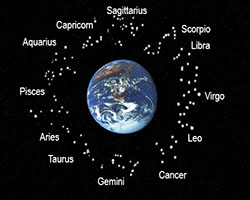Today, there are three major schools of Astrology: Eastern (or Vedic), Asian (including Chinese and Japanese), and Western. Although Vedic Astrology is gaining popularity in the West, most astrologers in the "Western" world practice Western astrology. This school of astrology was largely developed from Hellenistic and ancient Greek philosophers, mathematicians and astronomers, including Aristotle, Hipparchus, Plato and Ptolemy.
What is Astrology
 Astrology interprets how the relationships between the sun, planets, comets, asteroids, stars, and cosmic cycles in our galaxy affects our lives individually, and globally. No one really knows when astrology began; humans have been gazing at the sky in wonder ever since humans came into being. We do know there were astrologers as early as 3800 B.C.. And, we have writings about astrology from several ancient cultures, including the Chinese, Indian, Babylonian-Chaldean and Egyptian civilizations.
Astrology interprets how the relationships between the sun, planets, comets, asteroids, stars, and cosmic cycles in our galaxy affects our lives individually, and globally. No one really knows when astrology began; humans have been gazing at the sky in wonder ever since humans came into being. We do know there were astrologers as early as 3800 B.C.. And, we have writings about astrology from several ancient cultures, including the Chinese, Indian, Babylonian-Chaldean and Egyptian civilizations.
Today, there are three major schools of Astrology: Eastern (or Vedic), Asian (including Chinese and Japanese), and Western. Although Vedic Astrology is gaining popularity in the West, most astrologers in the "Western" world practice Western astrology. This school of astrology was largely developed from Hellenistic and ancient Greek philosophers, mathematicians and astronomers, including Aristotle, Hipparchus, Plato and Ptolemy.
These men embraced the concept of a universe that is well ordered. So much so that no part is independent of the other. Western Astrology has been further developed from the wisdom of modern psychologists and psychiatrists such as Carl Jung and Milton Erickson, and from recent astronomy discoveries.
Astrology gave birth to astronomy. The two sciences went hand-in-hand until about 1500, when religion and science split over the controversial theories of Copernicus (that the Sun, not Earth was the center of the solar system). The reigning religious powers of the western world (Catholic Church) held on to the earth-centered, or geocentric belief, while the scientific world adopted Copernicus' theories. Fortunately, the supernova in 1572 changed the Catholic Church's belief in an unchanging, earth-centered reality. But the damage was done and the scientific world became more and more materialistic and astrology declined into superstition and corruption. It wasn't until the end of the 19th century that "true" astrology reemerged, largely through the writings and teachings of Madame Blavatsky, founder ot Theosophy. Today, it is a growing, evolving, technology for understanding the world and our part in it.
Order The Cerfitication Astrology Course at Metastudies.com